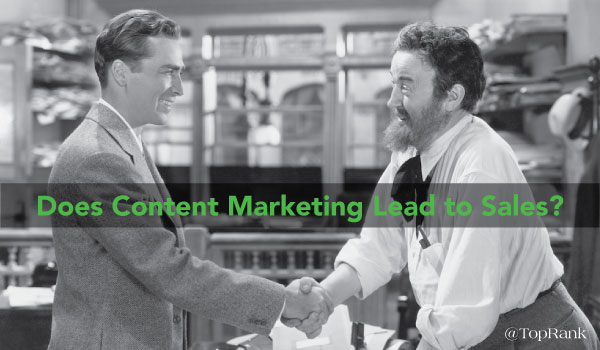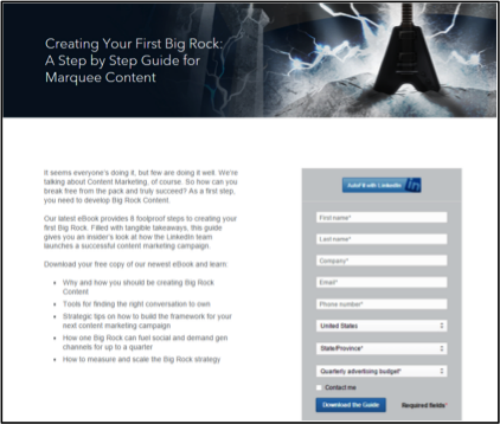
Hi, I’m Josh. I’m a content marketer and proud to be one.
Content marketing is unique among marketing tactics. It aims to accomplish business goals by offering people something of real value that can make their lives better.
It’s not, “you are lacking something in your life, so buy our product.” It’s not, “Read these exaggerated claims about our product and buy it.” Content marketing (as part of an integrated digital marketing strategy, of course) only works if you provide value to your audience. How cool is that? You provide value, they buy stuff, and everyone goes home happy.
As nice as it sounds, though, the previous sentence is missing a sizable chunk in the middle. Without lead generation, this is your content marketing plan:
- Phase One: Create Content
- Phase Two: ??
- Phase Three: Profit!
Phase Two is where content marketing gets real. We talk a lot about how content has to have value to be effective, but hardly ever talk about why. The reason content must be valuable is because we are asking for something valuable in return. We want to know who our reader is and we want permission to contact them again. We want to enroll them in a sweet lead nurture program—or put another way, we want continued chances to explain why they should buy what we’re selling.
So let’s talk about how you can offer your audience not just value, but a compelling value exchange:
It Starts with Creating and Amplifying Quality Content
Before you can use content to capture leads, you need two things: 1) great content, and 2) an audience.
Hundreds of thousands of words have been written about creating great content. We’ll assume that you already know how to create something of value to an audience. But just in case, this SlideShare will give you a quick 101 (and a few chuckles):
Once you have killer content, help it find an audience with SEO optimization and amplification. Influencer marketing is another solid way to make sure your content earns readers you can convert into leads.
So you have your content. You attracted an audience. Now it’s time to pull in the leads.
How to Capture Leads with Four Types of Content
#1 – The Humble Blog
Many content marketers think of blogs as a tool for raising awareness and establishing thought leadership, more than as a lead generation powerhouse. But it’s possible to build an entire business with nothing but a blog – just ask Joe Pulizzi. You can capture leads from your blog in two ways:
- Get e-mail subscribers. Regularly deliver such great content that your audience will opt in to hear more from you. Include a CTA to subscribe at the end of every post, and off you go.
- Offer content upgrades. Your blog posts provide enough value to convince someone to invest their time reading it. Add an extra incentive to inspire them to share an email address, something customized for each post. It could be a PDF download of the post for offline reading, a checklist, a template—anything that adds just a shade more value to compel a conversion.
#2 – eBooks
Unlike blog posts, eBooks tend to be gated assets from the get-go. So your theoretical reader has to pony up before they see if the value exchange is worth it. Some marketers believe gating assets limits their potential reach. There’s no denying you will get fewer downloads of a gated asset than an ungated one—but the people who do opt in are more likely to be higher-interest leads.
To make sure you make the case for your reader to fill out the lead gen form, consider using the “Big Rock” model. Create a comprehensive, high-value piece of content for your gated asset. That’s your Big Rock. Then use ungated content—blog posts, SlideShare presentations, infographics—to make the case for the Big Rock. Each ungated asset can focus on a small part of the Big Rock, with a CTA at the end leading to the Big Rock landing page.
On your landing page, address specific benefits of the eBook in quick ‘n’ dirty prose. Well, maybe just quick. Dirty optional. Keep it to a short paragraph of introduction and 3-5 bullets that highlight specific things the reader will learn in the eBook. LinkedIn Marketing kept it short and sweet with this landing page:

#3 – Webinars
A webinar is a live streaming event your readers can sign up to attend. The act of registering for the webinar is the lead capture.
In many ways, the Big Rock promotional strategy works for webinars just as it does for eBooks. Use the theme of the webinar to produce ungated assets that encourage registration: blog posts that tease the content, infographics related to the key talking points, even a simple announcement on the blog can help drive people to the landing page.
A webinar is a good opportunity to partner with influencers, as well. Influencers can help publicize the event and provide more value for the attendees.
The only drawback of the webinar is it’s a one-time event—there are hundreds of landing pages out there, soliciting registration for an event that has already come and gone. It’s worth recording the webinar and making that the new gated asset to make it evergreen. You can continue to promote the recording with ungated interviews with participants, roundups of takeaways, etc.
#4 – SlideShare
LinkedIn SlideShare is a handy way to organize and share visual content. A high-quality, visually compelling SlideShare can be a great lead-in to a gated asset—you can include a CTA and a link directly on a slide.
You can also embed a lead capture form in the presentation as well. While including a link in your slides is free, embedding a lead capture form is a paid solution. But it does offer some advantages. LinkedIn can target a specific audience with its massive collection of demographic data, and users can autofill the form using their LinkedIn credentials for an easier conversion. This SlideShare breaks it down for you:
Take the Lead(s)
Lead capture puts the “marketing” in content marketing. Without it, we may be making people’s lives a little better, but we’re not making a stellar case for our continued employment. When it’s done properly, though, asking for something in return doesn’t diminish the value of what we provide. If anything, it enhances the content—it gives the reader a logical next step towards solving their problem. So put your blogs, eBooks, webinars, and SlideShare decks to work, collect the leads, and continue the journey with your lead nurturing program.
What’s your go-to tactic for turning content into leads? Let me know in the comments.
Need help turning your content into content marketing? We’ve got you covered.
Disclosure: LinkedIn Marketing is a TopRank Marketing Client
Header image via Shutterstock


